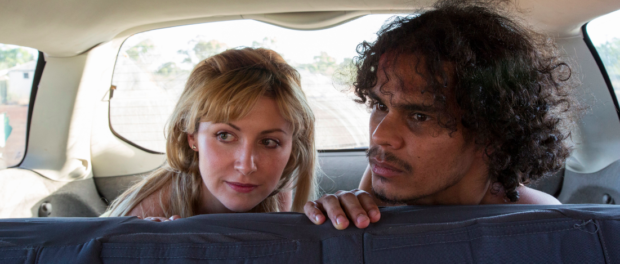Last Cab to Darwin: Drive Through a Continent
A middle age cab driver named Rex Macrae (Michael Caton) lives in a small town in the heart of the Australian continent. He will undertake a journey that will take him 3000 kilometers north from Broken Hill, New South Wales to Darwin, Northern Territory.
Last Cab to Darwin starts with Rex’s run-in with his indigenous neighbour Polly (Ningali Lawford-Wolf), who warns Rex to not fill her trash can with his garbage. A minute later, Polly struts across the dusty street that lines between their homes, over to Rex’s with a tray of tea. The two neighbours hang out on Rex’s front patio. Their shared past and continued fondness for each other will be revealed later on in the film, but right at the outset this unusual relationship takes centre stage. Wolf is feisty, on point and very present as Polly, though given minimal screen time.
Rex has spent his life driving people around his town. As he makes his daily run, he picks up the same people who take the same routes, on cue, per routine and pretty comfortable. All seems quiet and unstirred in this little town. That is, until one day when Rex goes to his doctor and is diagnosed with stomach cancer.

Last Cab to Darwin. Photo by Wendy McDougall.
As Rex is unwilling to suffer the pain of treatment or having to live with the disease, he decides to travel all the way to Darwin, where there has been some movement to legalize euthanasia. He calls the doctor who is at the forefront of the euthanasia debate and sets on the road: 3000 kilometres to be euthanized.
The film is interestingly placed in the heart of Australia (geographically) and discovers its rather treacherous natural habitat, its endless dirt roads, and that stretch from the South to the North through an interesting way of life. En route, Rex picks up a young indigenous man, who couples up with a travelling nurse and they become his companions for the entirety of the trip. Rex is this solitary, ordinary man whose life is turned upside down by this one incident, to the hilt.

Last Cab to Darwin. Photo by Wendy McDougall.
After driving through what is a visual treat of the Australian desert and plains, we finally land in Darwin. Rex is faced with the utter and asinine complexities of specialists and government watchdogs, who must ensure that he is really willing to be euthanized. As his doctor searches for the one witness she needs, Rex realizes what his life is and should be.
It’s not unique in the sense that Rex’s evolution as a character is not multidimensional and his search for some comfort in his painful situation is all he has. It has shades of a universal resonance for peace and home and belonging. Director Jeremy Sims is great with his shots and the pace of the film. I always like to see more shades than mere token diversity of characters, and/or summarily addressing issues of colonized parts of the world, but in this case the simple narrative didn’t have that much space perhaps. Rex’s life takes an interesting turn and his desire to find some peace finally leads him down the path of rediscovery.
Last Cab to Darwin is now available on DVD.






